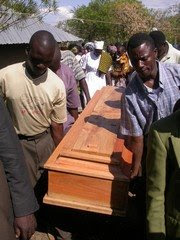 Mourning is closely followed by merry-making at disco funerals
Mourning is closely followed by merry-making at disco funeralsThe music blaring through Nyahera village in Kenya's southwestern Nyanza Province comes from two large speakers strategically placed at Mzee Dishon Onyango's home. Youths, some as young as 12, gyrate to the beats of their favourite music and consume a local illicit brew; others smoke bhang [marijuana] with abandon.
The revelry at Onyango's home is not your everyday party. He has just buried his son, Erick, 24, who died of an AIDS-related illness.
Disco funerals, a common phenomenon in the province, can go on for days and are especially popular with the young people in rural areas that lack any other form of night life.
"For us, the mourning is over and it is now time to party our way," said Kevin Otieno, 17, one of the guests. "This is the only opportunity we have to drink and smoke bhang freely. Where else is a man entitled to sex without really trying too hard? As I dance here, I have already made a date with two girls."
The possibility of contracting a sexually transmitted infection (STI), including HIV, does not bother Otieno, who cannot remember the last time he used a condom. "Condoms are for those with time, like one sleeping with a girlfriend, but here time is never on your side."
Daisy Awino, 16, admitted she had sneaked from a nearby girls' school with some of her friends to come to the party. "We normally come to these parties to meet men we can dance with, and even have a one-night stand before we go back to school," she told IRIN/PlusNews.
"At times a girl can be forced to sleep with even five men under the influence of alcohol, and some become pregnant or even contract diseases like syphilis, but I consider that as an accident," she said. "A plane crash in another place does not stop you from boarding a plane."
According to Dr Charles Okal, the province's AIDS/STI coordinator, disco funerals, where young people engage in risky sexual behaviour under the influence of drugs and alcohol, have become a dangerous source of HIV infection in Nyanza, which already has an HIV prevalence rate of 15.3 percent - double the national rate.
"It is ironic that one dies of HIV and his or her burial provides a perfect opportunity for others to get the disease," he said. "What you end up with is a village made up of a generation of young, sick people, and it is sad."
A 2008 study in Kisumu, the provincial capital, by researchers from the University Medical Centre in the Netherlands, found that disco funerals provided numerous opportunities for high-risk behaviour and could be a contributing factor to the high HIV prevalence among young people in the area.
"Many adolescents reported having casual sex on these occasions, sometimes with multiple partners, and mostly without condoms," the researchers noted in an article on their findings, published on 20 February in the journal, AIDS. "Some girls were forced into sex, and there were several accounts of gang rape; sex in exchange for money was reported frequently."
More than 60 percent of Nyanza's people live below the poverty line. Mary Aoko, 16, admitted that she attended disco funerals in the hope of finding a man who would give her money in exchange for sex. "At times I can be lucky to get a man who is ready to give me money, however little, and I will have gained."
She became pregnant after having sex with a man at a disco funeral. "My child died, but life has to go on and that is why I still come to have fun and get money," she said. "I am lucky because one of my friends is actually sick [with HIV]."
The Dutch researchers recommended the urgent introduction of interventions targeting young people who go to disco funerals, and the families who organize them.
Okal advocates a total ban on disco funerals as the better solution. "Distributing condoms would be difficult because you never know where the next disco will be," he pointed out. Some districts in the province have banned the practice, but it is still common in most parts of Nyanza.
Disclaimer:This material comes to you via IRIN, the humanitarian news and analysis service of the UN Office for the Coordination of Humanitarian Affairs. The opinions expressed do not necessarily reflect those of the United Nations or its Member States.
Photo: Copyright IRIN
